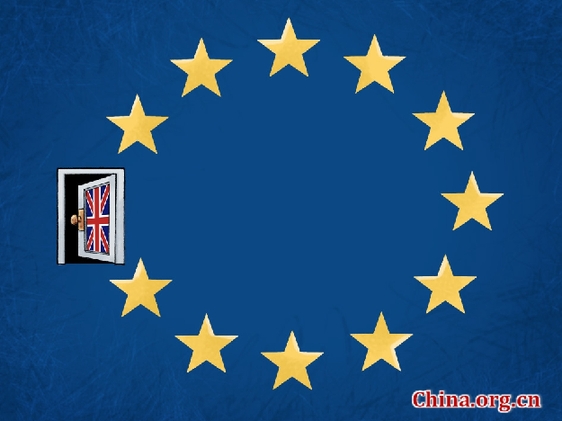As Brexit looms, what EU should remember
- By Sumantra Maitra
 0 Comment(s)
0 Comment(s) Print
Print E-mail China.org.cn, March 23, 2017
E-mail China.org.cn, March 23, 2017
|
|
|
'Brexit' [By Zhai Haijun / China.org.cn] |
As Britain decided to press the Brexit button on March 29, two pieces of significant news were circulating.
The first was an assessment that the impact of a "hard Brexit" on Germany would be extraordinarily severe, according to the president of Germany's DIHK Chambers of Industry and Commerce.
Mr. Eric Schweitzer noted that Britain was Germany's third most important export partner and then pointed out that, "EU membership is based on the free movement of services, goods, capital and workers ... Britain now wants to benefit from the first three but do away with the free movement of workers and that's not possible, above all because there could then be copycats" highly detrimental to European unity.
The second piece of news concerns a prospective military agreement between Germany and Britain, immediately post-Brexit, governed by a joint operational doctrine. This will include cooperation and joint training in areas like cyber security, offensive training and maritime patrol and defense of sea lanes.
In 1957, after the Suez debacle, London faced a major turning point in international relations. Britain and France had invaded to prevent Egypt nationalizing the Suez Canal, but found themselves deserted by the U.S., and about to face the Soviet Union's wrath.
Faced with the prospect of nuclear annihilation, and the choice of a diminished role in international relations, Britain and France drew two very different lessons from the disaster.
Britain became reconciled to the idea that its global power status was over, structural forces like the economy and manpower no longer permitting it to be a superpower engaged actively in all the parts of the world and thus gradually forcing it to take a backseat to the United States.
The ruling class in Britain was divided and wanted to continue with active engagement, but there was no popular support. France, on the other hand, sought to continue being an imperial power and, learning few lessons from Vietnam, became increasingly embroiled in Algeria. Both were disasters, and requiring rescue by the United States.
The question is back in the spotlight again, however: Who will defend free trade globalization? How and where will new alignments emerge? And who will lead the protectionist camps? More importantly, the question facing the U.S. after Donald Trump's election is: What lessons has the United States drawn from various events at a time when the American public obviously wants retrenchment?
Trump is certainly on course for a trade war. His withdrawal from the TPP and determination to renegotiate NAFTA, means the U.S. is abdicating its leadership role in trade. This is curious, because while Americans want a more balanced approach towards world politics, and intervention, they are quite supportive of the free market, and American consumers, especially Trump's own support base, will be the main sufferers in any trade war.
The question therefore is: What is the future of the liberal global order? In recent days, there's been a collective urge in media that German Chancellor Angela Merkel now holds the key as the defender of the global order; in fact, she doesn't.
To defend an international order, any order, a global leader needs to have the muscle to back up threats and have the manpower as well as money so that allies flock to the cause. Merkel lacks the muscle, as well as the popularity, while her position in the EU is as precarious as it gets.
France, ideally, could assume taking the mantle of liberal global leadership, but it's unlikely due to a falling economy. The British Prime Minister is running around the globe to find economic allies, with Australia and India obvious targets for her message that free movement is a precursor to a free trade deal.
It is important to remember, Britain is the premier economic and military power in Europe, and these are structural realities, which will remain regardless of Brexit.
At a time, when European continent is stagnating with low economic growth, and facing a resurgence of far-right nationalism, the key consensus should be on maintaining stability, both military and economic.
With the major powers including China and India supporting stability over fratricidal bargaining, EU officials in Brussels should keep in mind that partnership with London is the only way forward.
Sumantra Maitra is a columnist with China.org.cn. For more information please visit:
http://www.formacion-profesional-a-distancia.com/opinion/SumantraMaitra.htm
Opinion articles reflect the views of their authors only, not necessarily those of China.org.cn.






